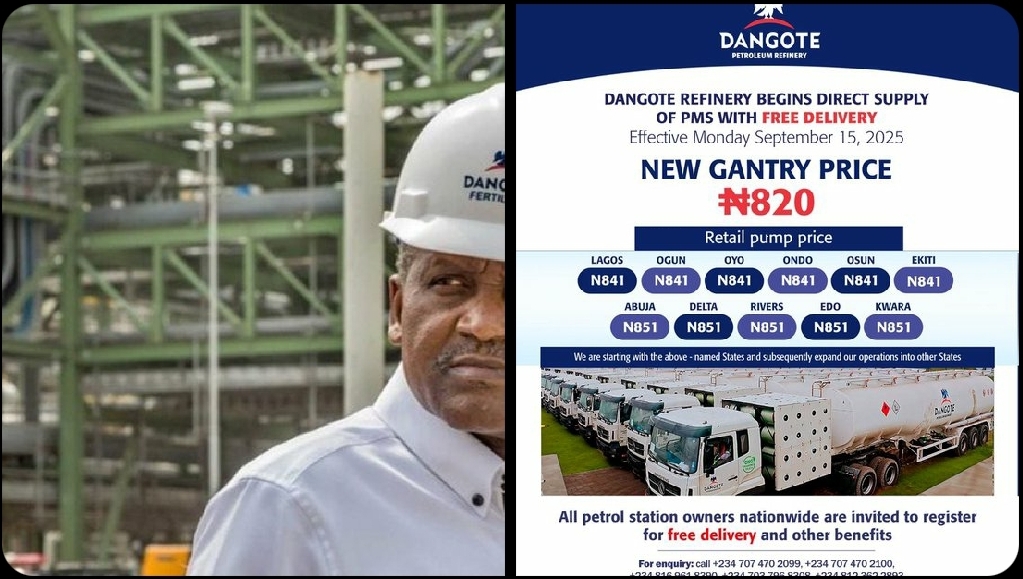
Dangote Refinery Slashes Petrol Prices to N841 as Free Delivery Begins September 15

In a move that could alter the trajectory of Nigeria’s fuel crisis, Dangote Refinery has announced a strategic cut in petrol prices to N841 per litre in Lagos, alongside the rollout of free delivery services starting September 15, 2025.
The decision comes at a time when Nigerians are still reeling under record-high pump prices, which have soared to as much as N1,200 per litre since the removal of fuel subsidies and the nation’s heavy reliance on imports.
This announcement, first reported by BBC News Pidgin, signals a dramatic intervention by Africa’s richest man, Aliko Dangote, into a sector defined by scarcity, speculation, and inefficiency.
For many Nigerians, who have endured months of crushing fuel costs, the price slash offers not just relief but a potential realignment of power in the petroleum market.
The refinery’s move is not without context. Just weeks ago, Dangote settled a heated dispute with the Nigeria Union of Petroleum and Natural Gas Workers (NUPENG), which had accused the refinery of attempting to undercut union power through the creation of a rival drivers’ association.
With that storm behind him, Dangote has now leaned heavily on logistics innovation—backed by the acquisition of 4,000 CNG-powered trucks—to push fuel directly into the market, bypassing some of the layers of middlemen that have historically inflated prices.
Industry insiders, however, warn of unintended consequences. Billy Gillis-Harry, President of the Petroleum Products Retail Outlets Owners Association of Nigeria (PETROAN), told Reuters in June that Dangote’s direct-distribution model, while efficient, could trigger job losses among independent fuel traders and threaten thousands of small operators who rely on margins from reselling. “The danger is in concentrating power,” Gillis-Harry cautioned, pointing out that while consumers may initially benefit, the long-term effect could weaken competition.
The timing of the move is also strategic. Dangote’s gasoline unit, which had been shut down for two to three months due to catalyst leaks as reported by Reuters on September 4, is scheduled to restart operations on September 20. Once fully online, the refinery could flood the domestic market with petrol, stabilizing supply and potentially driving prices even lower. This prospect has fueled optimism but also raised eyebrows among skeptics who recall the August 31 truck accident involving Dangote logistics that resulted in fatalities, sparking concerns over whether the refinery’s rapid expansion is compromising public safety.
For everyday Nigerians, the bigger question is whether the refinery can deliver sustained relief in a market long plagued by volatility. Analysts point out that beyond price cuts, trust remains a fragile currency. The refinery’s success in this new chapter will depend not just on competitive pricing but also on proving that it can reliably deliver fuel without the controversies that have shadowed its early months.
With free delivery set to kick off on September 15 and the gasoline unit returning five days later, all eyes are on Dangote. Will this mark the beginning of a new energy era, or will Nigerians once again find themselves caught between promises and scarcity?
One thing is clear: the game has changed, and the ripple effects of this refinery gamble will be felt far beyond the petrol stations of Lagos.


